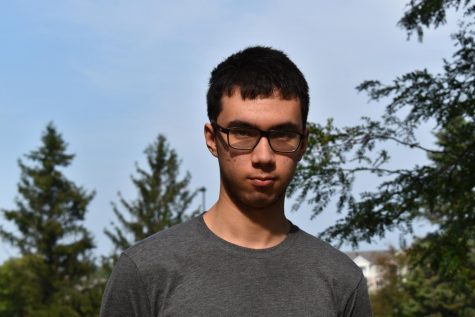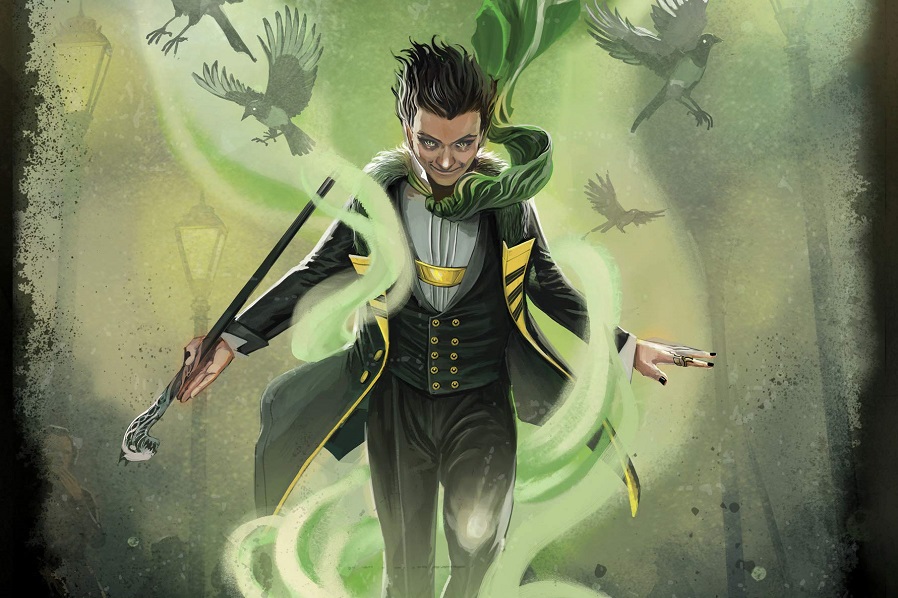“Loki: Where Mischief Lies” is a brilliant examination of the famed character
Mackenzi Lee’s take on Loki, the God of Mischief, is a brilliantly realized character portrait that masterfully blends mythology and mystery.
Cover art for “Loki: Where Mischief Lies,” a tale of how Loki came to become the God of Mischief.
Loki: the God of Mischief, Prince of the kingdom of Asgard, adopted brother of Thor, the wronged son of the devious Frost Giants. His tales of plunder, adventure, and roguery have always been a shining spot of his profuse roles in both Marvel comics and their adaptations for the screen. Best known for his deceitful nature and ever-so-shifting loyalty, Loki has become a fan-favorite of audiences. In more recent endeavors, he has been granted multiple solo series: an ongoing comic run, a 2021 miniseries to be on Disney+, and his very own novelization. That, of course, is Mackenzi Lee’s recently released “Loki: Where Mischief Lies,” the opening act of a to-be trilogy.
The story centers on a young Loki, taking place a century prior to his exploits in “Thor” and “The Avengers.” Born into a culture focused on power and strength over cunning, his magical abilities are constantly repressed by Odin, the All-Father of Asgard. When Loki discovers using a precognitive relic that he will bring about the destructive Ragnarök, his powers spiral out of control and lead to the framing and successive banishment of Amora, his only fellow sorceress and confidant. As Loki is sent on a peacekeeping mission to Midgard (Earth) for redemption, he comes to terms with his unfettered abilities—and faces the gnawing dilemma of who he is meant to be.
Though I’ve yet to read any of Lee’s works other than “Where Mischief Lies,” the gist I’ve gotten from them is a constant undertaking of fictional tales taking place in the rich environments of previous-century periods. Along with that, there is a pattern of addressing issues of such times like sexuality and gender roles. With that taken into account, a book like “Where Mischief Lies” never felt like something I would expect to come from her mind. As it happens to turn out, though, Lee shows herself to be more than competent in writing about the mythology of Asgard and the Nine Realms. Though her prose is never heavy on exposition, it nails the grandiosity of the Gods, simultaneously adding her own take to the long and varied mythology while emulating past works. You don’t have to be familiar with any folklore to appreciate her vision, but those already acclimated will more than relish it.
Despite this increased focus on Norse mythology, over half of “Where Mischief Lies” is set in the murky, smoke-filled streets of 1900s London. Lee obviously did her fair share of research, and it shows. Her wording gives a descriptive look at what it was like in this timeframe, smartly placing expositional clues into dialogue and the reactions of background characters. This was a period of murder sprees, plagues, judgemental attitudes, where people act both differently and the same from today. But more than perfectly bringing London to life, the story also weaves in a “magic in the real world,” Harry Potter-esque tone that lights up an already intriguing backdrop.
The characters at the forefront of these two settings are as deftly written as their environments. On one side of the pendulum, there are the Gods themselves—Odin, his wife Frigga, Thor, as well as several others. Even though they are all side characters, they get developed beyond one-dimensional stereotypes. Odin is all-powerful and unrelenting, Frigga is sympathetic yet always stands with her husband, Thor is the haughty but less intelligent older brother to Loki. Beyond these surface level characteristics, Lee imbues themes of family love, indecision over how to be one’s best, and more. Odin and Frigga want Loki, to be the best he can for society, even if that means having to restrict the full extent of his powers, Odin being the the more autocratic. Thor wants to be king, but also wants to protect his brother as best as he can. There’s also Amora, the sorceress who befriends Loki before getting banished. Her development is adequate, acting both as a foil to Loki and otherwise. Her personality, however, delves into predictable and generic nature near the endgame.
On the other side of the pendulum are the Earth, “Midgardian” (that’s what Loki calls them) figures. Theo Bell, an investigator of Earth’s SHARP Society dealing with extraterrestrial threats is imminent here, as he brings Loki into a magical whodunnit murderer mystery involving magic and the living dead. He is certainly the more vulnerable of the pair, his firsthand meeting coming with guileless enthusiasm.
None of these characters are as well-developed, as potent as Loki himself. Faced with his inner demons, his constant struggle to be his own person and not let the preconceived conceptions of who he is meant to be truly stands out. Lee writes him as a man standing at the divide between hero and villain, yet never clearly assign him to either one of the roles. That’s what makes her understanding of Loki impeccable; she lets the readers into all of the tumult threatening to burst out of him, yet never exactly writes him as a hero either. For many instances throughout the novel, he lies, cheats, and manipulates those around him. After all, he is the God of Mischief. But when it comes to a point when he must make a decision about which side to stand on, Lee gives Loki real emotions, showing that even Gods can struggle with the same issues as humans do internally.
Another area that has to be mentioned is the romance. I’ve never been a fan of the genre myself, having always avoided any flat-out romance novels. Yet, whenever a romance pops up in a book that isn’t strictly defined to the genre and I’m forced to read one, I’ve found that many have failed to mean anything. They either begin too quickly, or are too slow grinding so that when it actually comes to bloom, I don’t care anymore. Lee’s romance in “Where Mischief Lies” shows how it is supposed to be done. She builds it up gradually, showing Loki’s dividing feelings between Theo and Amora. Loki is written to be from a world where showing one’s sexuality is never a crime, to which Theo responds wistfully. By the end, a definitive romance begins to blossom, and leaves room for it to continue to grow in the upcoming two books.
“Loki: Where Mischief Lies” is a brilliantly realized, capably written masterwork. Lee’s deft character writing, the perfect mix of mythology and mystery, and romance make it one of 2019’s best reads. Even if the prospect of the character has never interested you, this is a must-read for everyone. Grade: A
Your donation will support the student journalists of West High School. Your contribution will allow us to purchase Scholarship Yearbooks, newsroom equipment and cover our annual website hosting costs.

Edward Keen is a senior and this is his second year on staff, where he is Arts Editor. In his free time, he enjoys reading.




